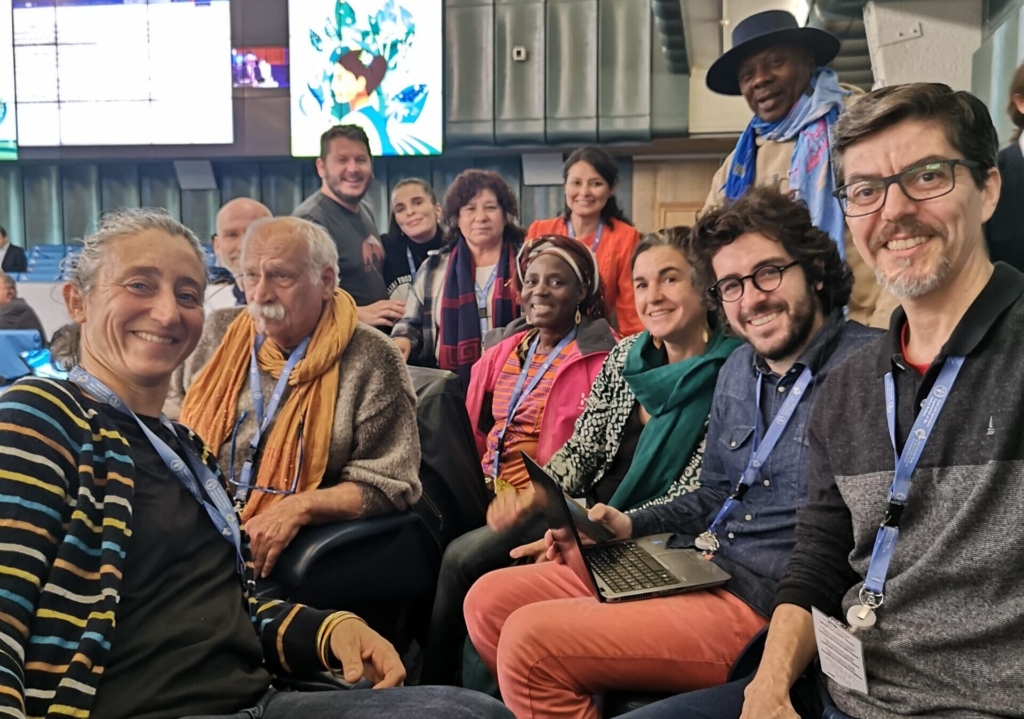December 1, 2023
When we arrived at the FAO plenary room in Rome, we could smell the unwillingness of some delegations since day one. Indeed, the 10th meeting of the Governing Body (GB) of the International Treaty on Plant Genetic Resources for Food and Agriculture (ITPGRFA) slipped away without any major decisions taken. Rather, the absence of decisions was itself a choice: that of continuing to circumvent the Treaty, not addressing the major issues that are driving the loss of agricultural biodiversity around the world, with huge impacts on peasants’ local communities. The insistence of the IPC delegation was not enough to make the wall erected by countries from the Global North crumble. Even the goodwill of Africa and Latin America, which supported the demands of social movements for food sovereignty, did not have the desired effect. We requested delegates to make a step forward from the 2019 Governing Body meeting. We asked them to stop the biopiracy by the seed industry, which uses Digital Sequence Information (DSI) and biotechnology to patent existing genomic traits selected by peasant and indigenous communities over centuries. This puts farmers in the position of being held accountable in court for violating intellectual property rights simply by cultivating their fields. This practice must be stopped immediately by applying the rules of the Treaty to DSI as well, not just physical seeds. But as long as there are countries denying the identity between the digitized genome and its physical manifestation, companies will be able to get away with it, at the expense of farmers.
The only acceptable outcome was that the Treaty’s multi-year program of work (MYPOW) will assess the impact of Digital Sequence Information on farmers’ rights to save, use, exchange and sell their seeds. But a new assessment means no real action until 2025. Likewise, on Farmers’ Rights (set out in Article 9 of the Treaty and the true heart of the text) the only result was the reconvening of the ad-hoc technical expert group (AHTEG). The group will work for the next 2 years to review and agree on the outline of the assessment of the state of implementation on Farmers Rights and provide conclusions by the 11th Governing Body. For more than 20 years we’ve been calling for Farmers’ Rights to be translated in national laws. We also asked for guidelines to be created to facilitate implementation by Contracting Parties. However, North American delegates blocked progress once again, until compromise was reached on passing the hot potato to a small group of “experts”. Too little to make us optimistic about the state of this global Treaty, created to protect agricultural biodiversity, and respect and promote Farmers’ Rights. Therefore, IPC decided to start working outside Treaty space, directly with those countries that have understood the importance of translating Farmers’ Rights into legal measures. We will do this through South-South Cooperation between farmers’ organizations and governments, to show the global North that not everyone is here to promote the interests of multinational corporations. In the meantime, to stop corporate biopiracy, farmers’ organizations will tell their members and communities to stop handing out their seeds to gene banks participating in the Multilateral System (MLS) set out by the Treaty. If the MLS cannot ensure that no patents are issued on those genetic resources, there is no point in continuing to legitimize the system by providing our seeds. We now have two years of intersessional work ahead of us (between Governing Body meetings), in which we will continue our institutional guerrilla to protect and promote the realization of Farmers’ Rights to seeds.
The IPC delegation at the Governing Body meeting was composed of: Antonio Onorati and Alessandra Turco (ARI/ECVC – Italy), Guy Kastler (Confederation Paysanne/ECVC – France), Marciano Silva (MPA/LVC – Brazil), Enso Ortt (MAELA – Argentina), Alicia Sarmiento (IITC – Mexico), Jessie Power (AFSA – Australia), Anne Berson Déna and Alimata Traoré (COASP-Mali/CNOP/LVC – Mali), Omer Agoligan (COASP – Benin)
Statements
